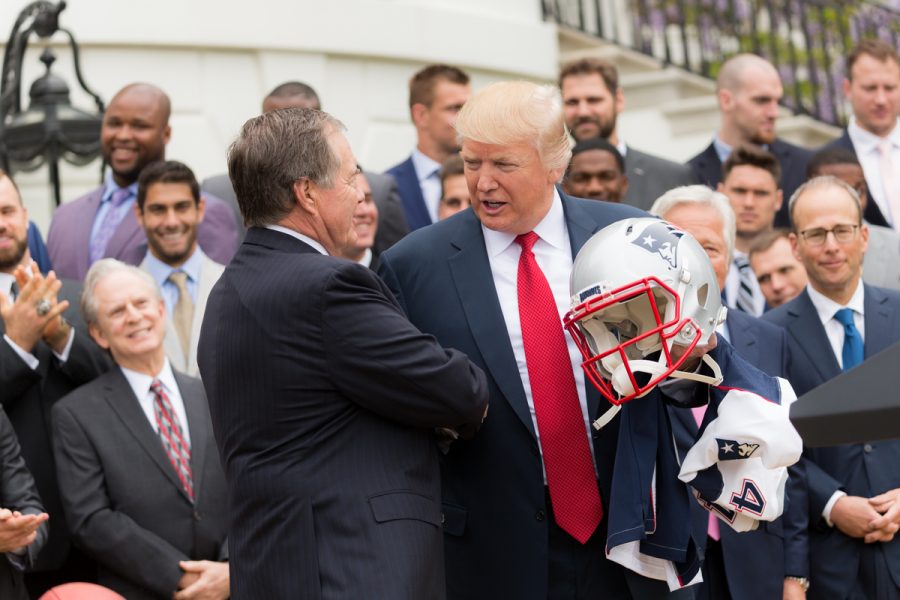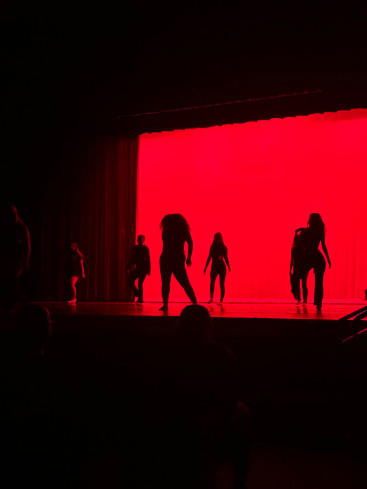Unraveling the debate over the Pledge of Allegiance
Meeting with the players and staff of the New England Patriots in 2017, President Trump would later declare that NFL players would be dismissed to the locker rooms if they failed to stand for the National Anthem. This was another dispute that arose as a result of Kaepernick’s trailblazing.
March 20, 2019
For as long as America has existed, patriotism has been prominent within the hearts of its estimated 325.7 million prideful inhabitants. This has been reflected in rituals like the Fourth of July and reciting the National Anthem at ballgames. Although always controversial, the conversation was stirred when former 49ers quarterback Colin Kaepernick took a knee in 2016.
During a 49ers preseason game against Green Bay, Kaepernick refused to stand for the anthem. He claimed that he was uncomfortable showing pride in a flag of a country that oppresses people of color. This prompted a rise in conversation about police brutality which made Kaepernick’s peaceful protest much broader than a game.
The argument is that not standing for the anthem disregards the sacrifices made by U.S. soldiers. Many feel that the National Anthem pays respect to veterans. Another concern raised is that in an effort to bring awareness, Kaepernick’s supporters have caused division across the country. Some are against it because kneeling is a counterproductive way to promote a cause, when in fact, Colin Kaepernick’s surprising stance generated an important conversation that forced people to pay attention.
It is not justified to be angry with people for kneeling because dissent is the highest form of patriotism. In the end, this country does not express the values it holds; there is no “liberty and justice for all.” Many soldiers do not care whether or not people kneel. Those who kneel are exercising the rights that the soldiers defend.
After hearing from multiple voices at Millbrook, it was surprising to learn the varying arguments. “The whole narrative of all veterans being heroes is kind of odd to me,” said sophomore Kim Nguyen. “Their jobs are very important, but most do it as a career choice, not because our freedom is being threatened,” was one of many reasons why people do and do not stand.
When asked the question do students at Millbrook stand for the Pledge of Allegiance? The responses varied— ‘Yes, because it’s something I’ve always done,’ ‘No, because justice for all is not true,’ or even ‘No, because I don’t feel like it.’
One of the most interesting responses was from a student who requested to stay anonymous, saying that standing for the pledge depended on the circumstances. When in a room full of white peers, she feels pressured to stand as well, but in a class of people of color like herself, she feels she can freely express her right to protest.
The underlying narrative expressed in public schools that the pledge is to be recited every morning creates a spirit of conformity and fear in some, comparable to Adolf Hitler’s regime. We have freedom of religion and speech, and it is written that the U.S. is a secular country. Many feel that imposing the statement “under God” is contradictory and unconstitutional.
There is just as much of a reason to stand for the flag as there is to kneel. Sophomore Ashley Jean comes from a military family and stated that she stands “with pride, and although it may not seem like it in these tough four years with President Trump, we are a United States. [I stand] to emphasize the morals of ‘liberty and justice for all’ because I feel that if I don’t stand and pour my heart into those words, nothing will ever change.” Her response is progressive; while most people stand because they are grateful for the privileges they are given as a citizen of the U.S., Ashley stands for the anthem because she understands that America is flawed, but can be bettered.












